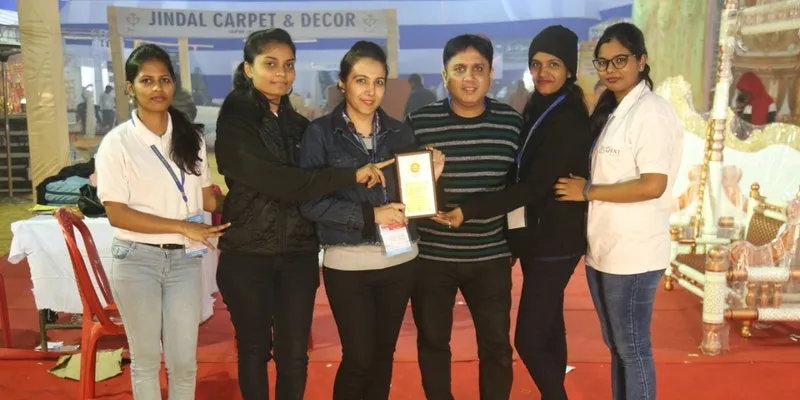[Startup Bharat] How this Nagpur-based couple built an ecommerce platform for decoration services
Decornt is an online marketplace for users to purchase the necessary materials for decoration and catering purposes.
Having been raised in a small town named Chhindwara in Madhya Pradesh, Lagan Saluja and Kamal Saluja, the founders of , noticed that businessmen in the decoration and tents industry spent a lot of time travelling to other cities to procure the necessary materials.
Lagan says, “Some goods and materials are not easily available in our location as they are in larger towns and cities. There was a dearth of a platform that could bring these two together.”
This is where the seed of Decornt was planted, and the startup was established to bridge the gap between vendors and consumers by creating an online platform for both buying and selling of decoration Items.

The Decornt team
Started in Nagpur in January 2017 by the husband-wife duo, Decornt helps vendors and customers collaborate not just in India but also in Nepal.
Wanting to build a brand name that is analogous with the decoration business and an online marketplace, the couple named it Decornt.
The team
Lagan Saluja worked with some IT giants before pursuing his entrepreneurial dream. He was also involved in establishing a call centre training institute in Bengaluru, and ran a talent acquisition consultancy for IT and ITeS companies.
Co-founder Kamal Saluja spent five years running a chain of schools in pre-primary education in Nagpur before starting up with her husband.
The 10-member-team is currently spread across operations, sales, marketing, and logistics.
Business model and market landscape
The team has created a visual store to sell tents, decoration, and catering materials. The ecommerce site currently supports both B2B and B2C segments.
The company has an app where users can choose from over 5,000 items in the product line. With online payments and cash-on-delivery made available to its customers, the platform claims that it delivers to over 25,000 pin codes at present.
Decornt makes money from a percentage-based commission on every product sold, charges a membership fee and takes commission on refurbished and used products.
In FY18, the startup made a revenue of Rs 10 lakh, in FY19 it saw Rs 35 lakh in revenues, and has made Rs 87 lakh in FY20, as of January 7, 2020. It introduced cash-on-delivery from October 2019, which Lagan says has led to a major boost in sales.
Competition and challenges
With respect to the online marketplace model, Lagan says they do not have any direct competition but there are always physical stores across the country.
“Customers could be apprehensive of online purchasing and prefer to stick with the traditional idea of buying from stores located in different cities. There are also sites like IndiaMart and JustDial that provide the information on vendors and their contacts,” he says.
While it took six months to build the platform fully, including the website, a mobile app, and an engine for logistics and delivery, Decornt started its operations in the Nagpur area to begin with.
There was plenty of resistance when the customers were given an option to choose these products online. But the duo seems to have surpassed these hiccups and spread its footprint outside of Nagpur by participating in numerous trade exhibitions and with aggressive social media promotions.
Way forward
According to Lagan, Decornt’s unique proposition lies in its ability to cater to both B2B and B2C markets, and listing of all the product categories in one single application. He says cash-on-delivery (CoD) is a first in this industry.
Decornt is a bootstrapped startup and has not approached any external funding since its inception. However, for future expansion and growth of the company, Lagan is eyeing the VC industry.
Going forward, Lagan says he is looking to amplify the customer-base across India, apart from the seller-base, and wants to promote online shopping in Decornt’s target markets, and also looking at international markets.
“We want to build a distribution network by creating 100 referral accounts across the country by the first quarter of FY2021. We are also looking to upgrade the technology to make an end-to-end web portal for our users,” he says.
(Edited by Megha Reddy)


![[Startup Bharat] How this Nagpur-based couple built an ecommerce platform for decoration services](https://images.yourstory.com/cs/2/730b50702d6c11e9aa979329348d4c3e/Image4d93-1578482424669.jpg?mode=crop&crop=faces&ar=2%3A1&format=auto&w=1920&q=75)
![[Startup Bharat] This online travel platform helps users customise their holidays and trips the old-fashioned way](https://images.yourstory.com/cs/2/79900dd0d91311e8a16045a90309d734/TravelSpocTeam-1577873461519.PNG?fm=png&auto=format&h=100&w=100&crop=entropy&fit=crop)
![[Startup Bharat] Small-town startups go the bootstrapping route, show VC funding isn’t the norm for success](https://images.yourstory.com/cs/2/a9efa9c02dd911e9adc52d913c55075e/DigitalTrendsStartupBharatYourStory15562101162721575378002446png?fm=png&auto=format&h=100&w=100&crop=entropy&fit=crop)




